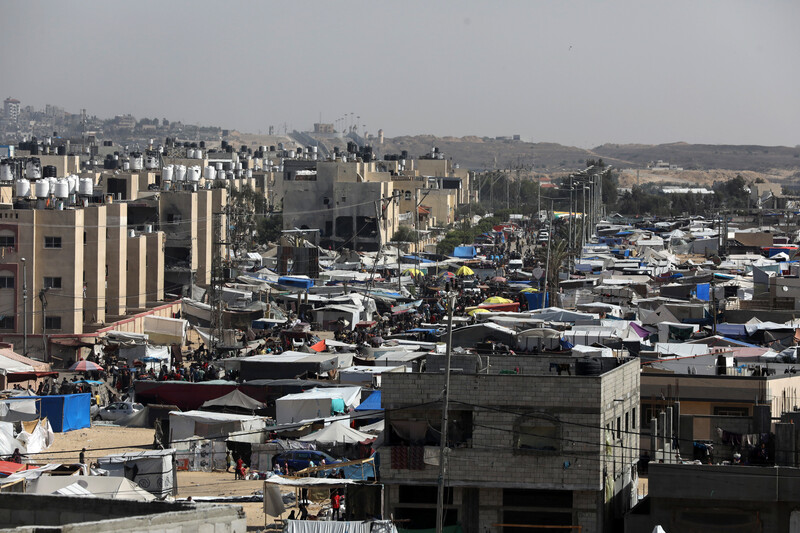The Electronic Intifada 22 May 2024

Israel is subjecting Rafah – where vast numbers of displaced people have gathered – to a major attack.
APA imagesMuhammad Abdo had been waiting for months so that he could leave Gaza for medical treatment in Egypt.
In March, he was wounded during an Israeli assault on Nuseirat refugee camp in central Gaza. Since then he has been treated at al-Aqsa Martyrs Hospital in the city of Deir al-Balah.
Muhammad, 29, has burns in various parts of his body, as well as a serious spinal injury. He needs a form of surgery that is unavailable in Gaza, where the healthcare system and its workers are under attack and overstretched.
After receiving a referral from the administration in Gaza, Muhammad was informed that his travel to Egypt had been scheduled for 7 May. By the time that date arrived, Israel had taken control of the Rafah crossing, the exit and entry point for travel between Gaza and Egypt.
As a result, Muhammad has been unable to leave Gaza.
Zahwa, Muhammad’s mother, noted that his health is deteriorating.
“Muhammad is only taking painkillers to relieve his back pain and burns,” she said. “Nobody knows what lies ahead for him.”
Several of Muhammad’s siblings have emigrated to Europe. Muhammad – who has a degree in civil engineering – is among the few members of his immediate family still in Gaza.
“I have no other son around me apart from him,” Zahwa said. “I am scared of losing him.”
The Euro-Med Human Rights Monitor has stated that the closure of the Rafah crossing has made it impossible for approximately 11,000 injured people to receive treatment they need outside Gaza.
In addition, more than 10,000 cancer patients and 2,000 people with other diseases need treatment that is unavailable in Gaza’s hospitals.
“When will I leave?”
Ibrahim Mansour was badly injured when Israel bombarded his family’s home in Bureij refugee camp, central Gaza, a few months ago. Numerous people were killed in that incident.
Ibrahim had several operations carried out by foreign doctors visiting Gaza.
He requires vascular surgery so that blood will keep flowing to the brain. While doctors have found a temporary solution using stents, the equipment required for a full operation cannot be found in Gaza.
So he has been referred for treatment in Qatar.
“Doctors told me that it is a miracle that he has survived,” Ibrahim’s father Abdel Sattar said, while emphasizing that Ibrahim must be allowed to leave Gaza for further treatment.
“I’m afraid that his health will deteriorate if he doesn’t get the treatment as soon as possible,” Abdel Sattar added.
Muhammad Abu Jarad, a patient with bone cancer, was supposed to leave Gaza on 7 May.
He has been referred for treatment in Turkey.
Muhammad had been undergoing chemotherapy at the Turkish-Palestinian Friendship Hospital in northern Gaza. Israel bombed that hospital – which specialized in cancer – at the end of October.
He was transferred to the European Gaza Hospital near the southern city of Khan Younis. He has struggled to find medicines that he has been prescribed, even those for pain relief.
Muhammad got a referral to be treated in Turkey and was scheduled for travel on 7 May.
After preparing for his journey, he was shocked to wake up that day and learn that the Rafah closing was closed.
While doctors are “always beside us,” he said, their ability to help patients has been drastically reduced by shortages of medicine.
“All they can do is give us some hope that we can leave for treatment,” he added.
“But when will I leave? When will the border be open? Before we die? Or after?”
Munir al-Dahdouh, 5, has Cornelia de Lange syndrome, a rare genetic condition.
He, too, was recently approved for travel outside Gaza. Yet Israel grabbed hold of the Rafah crossing before he could undertake that journey.
Munir has an irregular heartbeat and an enlarged liver.
“I am scared these problems will worsen unless they are treated,” his father said.
“I am praying for the border to be opened. I just want to save my son’s life.”
Abdel Karim al-Dardisi, 15, was bringing bread to his family in Khan Younis, southern Gaza, when Israel fired a missile toward him.
Rushed to Nasser Medical Complex in that city, he had to undergo a leg amputation.
He also has severe burns in his other leg and was referred for treatment in Egypt a few months ago.
Abdel Karim should have traveled on 7 May. Yet he will not be able to do so until the Rafah crossing is reopened.
“I want to get back playing football, even on one leg,” he said. “I want to protect my second leg and start my life again.”
Khuloud Rabah Sulaiman is a journalist living in Gaza.





